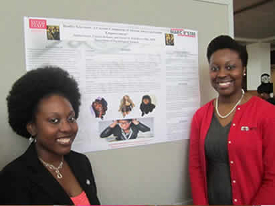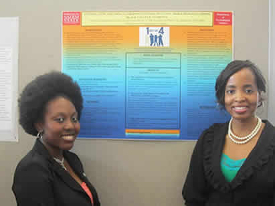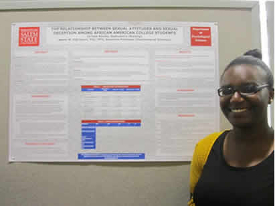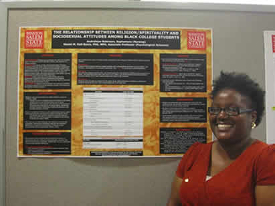Naomi M. Hall-Byers

Position: Associate Professor Department: Psychological Sciences
Contact Info
Office: Phone: 336-750-8800 Fax: 336-750-8650 Email: hallna@wssu.edu
Biography
Dr. Hall-Byers is an applied social psychologist, with an advanced degree in public health. Her overarching program of research focuses on psychosocial, sociocultural, and contextual factors associated with health disparities and inequities among youth and young adults (YEAs) of African descent. Most recently her work has focused on sexual decision-making and sexual behavior (particularly HIV-related risk behaviors) among African American YEAs with a focus on cultural influences and prevention. Her methodological expertise lies in utilizing quantitative and qualitative methods, often employing mixed methods, to identify potential key mechanisms and pathways of intervention to promote optimal sexual health, STI/HIV prevention, and risk reduction among YEAs. Her academic and professional background is quite diverse, and includes over 15 years of experience providing health education, program planning and development, organizational management, and evaluation training and consulting to non-profits, government agencies, and academic institutions. Dr. Hall-Byers is a visiting professor at the University of California, San Francisco Center for AIDS Prevention Studies, and a Fellow of the American Evaluation Association. She is an alumna of the NIMH/APA Minority Mentoring Program (HIV/AIDS Research Fellow), and the APA Cyber Mentors program. She is currently the Board Chair for LEAD Girls of NC, Inc., a grassroots organization focused on empowering at-risk pre-teen girls in the Piedmont Triad area. She is originally from Detroit, Michigan and is the youngest of nine children.
Educational Background
- PhD and MA, Applied Social Psychology, Claremont Graduate University
- MPH, Maternal and Child Health, San Diego State University
- BS, Health Sciences and Education, California State University East Bay
Research and Project Interests
- HIV prevention and testing in Black/African American communities
- Health disparities and inequities
- Sexual decision-making and behavior
- Relationship formation/maintenance
Matlock, J. R., Hall, N. M., & Cox, T. M. (accepted). Internalized racial oppression and its effect on mate preferences. Journal of Undergraduate Ethnic Minority Psychology.
Hall, N. M. (2016). Quotes, blogs, diagrams, and counter-storytelling: Teaching intersectionality at a Minority-Serving Institution. In K. A. Case (Ed.), Intersectional Pedagogy: Complicating identity and social justice. New York, NY: Routledge.
Mansfield, L., Onsomu, E., Merwin, B. Hall, N. M., & Harper-Harrison, A. (2016). Association between parental HPV knowledge and intentions to have their daughters vaccinated. Western Journal of Nursing Research. doi: 10.1177/0193945916682953
Lee, A.K., Corneille, M.A., Hall, N. M., Yancu, C. N., & Myers, M. (2015). The stressors of being young and Black: Cardiovascular health and Black young adults. Psychology and Health. doi: 10.1080/08870446.2015.1127373
Carter, L., Corneille, M. A., Hall, N. M., Clark, T., & Younge, S. (2015). Exploring user acceptance of a text message based health intervention: The role of privacy concerns and perceived risks. AIS Transactions on Human-Computer Interaction, 7(3), 110-124.
Hall, N. M., & Moye, R. (2015). Marginalization and racial barriers experienced by Black faculty at predominately white colleges and universities. Journal of Contemporary Issues in Higher Education, 1(2), 11-14.
Lee, A. K., & Hall, N. M. (2015). Enriching course development: The use of an international faculty development experience. Journal of Pedagogy and Human Sciences, 4(1), 60-69.
Hall, N. M., Peterson, J. & Johnson, M. (2014). To test or not to test: Barriers and solutions to testing African American college students for HIV at a historically Black college. Journal of Health Disparities Research and Practice, 7(1) PMC4271312
Hall, N. M., & Pichon, L. C. (2014). Gender roles, sociosexuality, and sexual behavior among U.S. Black women. Health Psychology and Behavioral Medicine, 2(1), 171-182.
Hall, N. M., Lee, A. K., & Witherspoon, D. D. (2014). Factors influencing dating experiences among African American emerging adults. Emerging Adulthood , 2(3), 184-194. doi: 10.1177/2167696813520154
Paxton, K. C., Hall, N. M., & Boykin, E. (2014). Family influences during childhood on African American women’s sexual behavior during young adulthood. Universal Journal of Psychology, 2(3), 113-116. Doi: 10.13189/ujp.2014.020303
Paxton, K. C., Villarreal, B., & Hall, N. M. (2013). Increasing knowledge of HIV transmission: An important ingredient in HIV risk reduction among young African American women attending community college. Journal of HIV/AIDS and Infectious Diseases, 1(2), 1-7.
Hall, N. M., & Applewhite, S. (2013). Masculine ideology, norms, and HIV prevention among young Black men. Journal of HIV/AIDS & Social Services, 12, 384-403.
Hall, N. M. (2012). Sociosexuality, human immunodeficiency virus (HIV) susceptibility, and sexual behavior among African American women. Journal of AIDS and HIV Research, 5, 43-51.
Hall, N. M., Morales, D. A., Coyne-Beasley, T. & St. Lawrence, J. (2012). Correlates of African American men's sexual schemas. Sex Roles, 67(11-12), 670-681.
PSY 2301: Introduction to Psychological Sciences
PSY 2430: Writing for the Psychological Sciences
PSY 3306: Abnormal Behavior
PSY 3307: Social Psychology
PSY 3312: Black Psychology
PSY 3318: Forensic Psychology
PSY 3350: Human Sexuality
PSY 4401: Research Methods and Statistics II
PSY 4310: Health Psychology
PSY 4321: Group Dynamics
PSY 4439: Seminar in Social Psychology
PSY 4440 Senior Seminar in Psychology
All sections of Independent Study
Grants/Fellowships
2016-2019 HBCU-UP Targeted Infusion Grant (#1623248): Infusing an Honors Curriculum to Enrich the Undergraduate Research Experience in Psychological Sciences. National Science Foundation (Role:PI).
2015-2017 The Use, Experience, and Conceptualization of Intimate Partner Violence among Black College Students Attending HBCU's. Society for the Psychological Study of Social Issues (Role: PI).
2013-2015 Culturally Tailored Approaches to STI/HIV Prevention among African American Youth and Emerging Adults. Health Disparities Loan Repayment Program, National Center on Minority Health and Health Disparities (Role: PI)
2012-2015 Developing STI/HIV Prevention Messages with Black College Students. National Institute of Mental Health (Role: PI/Subcontract, Parent Grant PI: T. Neilands)
2010-2014 Investigating the Sexual Milieu of Young African American College Students: Implications for STI/HIV Prevention and Intervention. Eunice Kennedy Shriver National Institute of Child Health and Human Development (Role: PI)
2010-2012 Cyber Mentors Program Career Development, American Psychological Association, Office of AIDS (Role: PI/Subaward, Parent Grant PI: J. Anderson)
2008-2010 Sexual Schemas and Sexual Behavior among Young Heterosexual African American Men. University of North Carolina, Center for AIDS Research (Role: PI/Subaward, Parent Grant: C. Golin)
2008-2010 Exploring Sociocultural Correlates of Responsible Sexual Behavior. Winston-Salem State University, Research Initiation Program (Role: PI)
Recent (2013-present) Conference Presentations (Oral/Poster)
Hall, N. M., & Lee, A. K. (2014, March). Sociocultural Factors Impacting Dating Experiences among African American College Students. Oral presentation at the Annual Southeastern Psychological Association Conference. Nashville, TN.
Lee, A.K., & Hall, N. M. (2014, March). The Relationship between Chronic Stress and Weight Indicators among Black College Students. Poster presentation at the Annual Southeastern Psychological Association Conference. Nashville, TN.
Hall, N. M., Peterson, J., & Johnson, M. (2014, March). Testing African American College Students for HIV at an HBCU. Poster presentation at the Annual Southeastern Psychological Association Conference. Nashville, TN.
Kea-Edwards, A.*, & Hall, N. M. (2013, April). Factors that Influence Young African American’s Willingness to Donate. Oral presentation at the Annual Behavioral Sciences and Social Work/Psychological Sciences Research Symposium. Winston-Salem, NC.
Green, J.*, Holland, U.*, & Hall, N. M. (2013, April). Reality Television: A Current Component of African American Female Empowerment. Poster presentation at the Annual Winston-Salem State University Scholarship Day, Winston-Salem, NC.
Robinson, A. M. L*, Manley, C. L.*, Witherspoon, D. D.* & Hall, N. M. (2013, April). The Influence of Sex Partner Selection of Condom Use among Non-heterosexual Male African American College Students. Poster presentation at the Annual Winston-Salem State University Scholarship Day, Winston-Salem, NC.
Holland, U.*, Eluka, N.*, Green, J*, & Hall, N. M. (2013, April). Investigating the Impact and Effectiveness of STI/HIV Media Messages among Black College Students. Poster presentation at the Annual Winston-Salem State University Scholarship Day, Winston-Salem, NC.
Media Coverage
| Year | Service |
|---|---|
| University | |
| 2012 - 2015 | Chair, Institutional Review Board |
| 2012 - present | Member, Scientific Literacy Committee |
| 2012 - present | Research Mentor, Bridges to Doctoral Program (in Nursing Department) |
| 2012 - present | Research Mentor, Chancellors Scholars Program |
| 2011 - present | Member, Provost’s Honors Advisory Council |
| 2011 - present | Member, Grade Appeals Committee (Social Sciences) |
| 2010 - 2012 | Member, Institutional Review Board |
| 2010 - present | Member, Research Initiation Program Review Committee |
| 2009 - 2012 | Member, Faculty Senate |
| 2009 - present | Research Mentor, Minority Access to Research Careers (MARC U*Star) |
| Professional | |
| 2014 - present | Steering Committee Member, APA Cyber Mentors Trainee Program |
| 2014 | Reviewer, Southeastern Psychological Association Conference |
| 2014 | Reviewer, APA Annual Conference |
| 2013 - present | Editorial Board, Journal of HIV/AIDS and Infectious Diseases |
| 2013 - 2016 | Elected Council Member, Society for the Psychological Study of Social Issues (SPSSI, APA Div. 9) |
| 2013 - 2015 | Member, Diversity & Policy Committees, SPSSI |
| 2008 - 2011 | Newsletter Co-editor, SPSSI |
| Year | Former/Current Lab Students |
|---|---|
| 2008 - 2010 | Chantel Ross (obtained an MA in Counseling from University of Texas, San Antonio) |
| 2008 - 2010 | Quintin Jones (International Sales Manager, Schreiber Foods) |
| 2009 - 2011 | Carese Bates |
| 2010 - 2011 | Courtney Smith |
| 2010 - 2011 | Kiara Burns |
| 2010 - 2011 | Makey'ba Charles |
| 2010 - 2012 | Charles Chavis |
| 2012 - 2013 | Jamila Green (enrolled in MA in Community/Social Psychology program at University of Massachusetts, Lowell) |
| 2012 - 2013 | Umaria Holland (enrolled in MA in Forensic Psychology program at Roger Williams University) |
| 2012 - 2014 | Amber Kea-Edwards (accepted to Positive Organizational Behavior PhD program at Claremont Graduate University, to begin Fall 2014) |
| 2012 - 2014 | Carissa Manley (current student, accepted to WSSU Nursing Program) |
| 2012 - 2014 | Andrelisae Robinson (current student, accepted to WSSU Nursing) |
Amber Kea-Edwards (Scholarship Day 2013)
Amber is a 2014 WSSU Psychology graduate and entering Claremont Graduate University’s PhD program in Positive Organization Behavior, Fall 2014

Umaria Holland and Jamila Green (Scholarship Day 2014)
Umaria is a 2013 WSSU Psychology graduate and currently in a Forensic Psychology graduate program at Roger Williams University. Jamila is a 2013 WSSU Psychology graduate (and MARC U*Star alumna) and currently in a Community/Social Psychology graduate program at the University of Massachusetts, Lowell.

Umaria Holland and Nneze Eluka (Scholarship Day 2013)
Nneze Eluka has a Masters degree from North Carolina State University and is currently investigating doctoral programs in either Psychology or Public Health.

Carissa Manley (Scholarship Day 2014)
Carissa is a Chancellor’s Scholar student and was just accepted into the WSSU Nursing program!

Andrelisae Robinson (Scholarship Day 2014)
Andrelisae a Chancellor’s Scholar student and was just accepted into the WSSU Nursing program!

